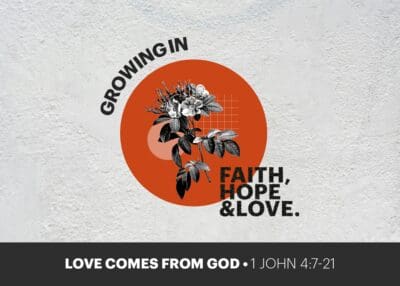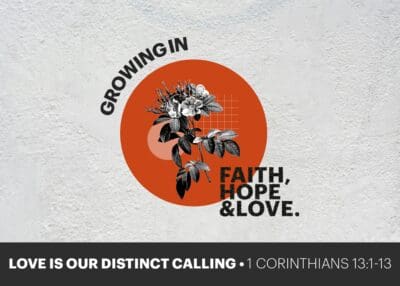“At the end of every seven years you must cancel debts.” (Deuteronomy 15:1)
Today, we come to chapter 15, which is an exposition and application of the fourth commandment, “Remember the Sabbath day and keep it holy” (Deuteronomy 5:12).
I want you to see how the root of loving God produces the fruit of loving others. Real self-sacrifice is not produced within us; it has its root in the love of God.
Using the Old Testament law properly
As we study Deuteronomy, it is important to remember that the particular applications of the Ten Commandments that are laid out here were given to the nation of Israel.
In the 12th century, a Jewish philosopher by the name of Maimonides published a definitive list [i] of Old Testament laws from the Pentateuch, in which he listed 248 commands, and 365 prohibitions for a total of 613 laws. These laws relate to worship, the temple, sacrifices, dietary laws, vows, ritual washings, festivals and a host of other things.
It would be a great mistake to draw a direct line from these Old Testament laws given to Israel to the Christian life today. For example, in Chapter 14 we have laws about clean and unclean foods. These laws were for Israel. But in the New Testament Christ proclaimed all foods clean (Mark 7:29).
This was a huge issue in the early church. Some people were saying that in order to be a Christian you had to believe in Jesus and keep the 613 Old Testament laws. When the Apostle Paul dealt with this, he made it clear that those who said this had “turned to a different gospel, which is really no gospel at all” (Galatians 1:6-7).
So, the command to cancel all debts every seven years (15:1) is not a command that God gives for you today. If someone owes you money, and they repay it to you over 10 years, you are not sinning if you receive it.
In the same way, it would be a great mistake to draw a direct line from the promises specifically given to Israel and drop them on the Christian today. For example, “[God] will richly bless you, if only you fully obey the Lord your God” (15:4-5).
Teachers of the “prosperity gospel” seize on words like these that were clearly given to covenant Israel, as if they were given to every Christian: “Obey God and you will be rich. ‘The Lord your God will bless you as he has promised and you will lend to many nations and will borrow from none’” (15:6). But that promise is given to Israel. God has not promised material prosperity to every Christian.
It is a great misapplication of the Old Testament, if you apply every command and every promise that was given to Israel and apply it directly to the Christian. You end up in great difficulty and confusion. We must not take what is distinctive to God’s covenant with Israel and apply these commands and promises to all people in every circumstance. Having said that, the law of God reflects the character of God. And the New Testament makes this clear, speaking of the Old Testament, “These things… were written down for us as warnings” (1 Corinthians 10:11).
The Old Testament law is full of principles that guide us in wisdom, as they are rightly understood and applied to our lives, “All Scripture is God-breathed and is useful for teaching, rebuking, correcting and training in righteousness” (2 Timothy 3:16).
I want us to see today how God’s words in Deuteronomy 15, that reflect His glorious character and purpose, teach us and rebuke us, correct us and train us in righteousness. I want to highlight some distinct ways that God speaks to us.
The Abundant Provision of God
“There should be no poor among you, for in the land the LORD your God is giving you… he will richly bless you.” Deuteronomy 15:4
When God’s people come out of the desert, and He speaks to them on the edge of the Promised Land, each family is given a portion of land. These tent dwellers, who owned nothing, became property owners with land and the means of sustaining an income.
What God gave to them, they were able to pass on to their children, which is why the word “inheritance” was used. If ever there was a land of equal opportunity, this was it. Everyone was given a house, and everyone was given a means of generating income.
We have called this series, “Take Two: The Power of a Fresh Start.” God’s people had a fresh start in the land, where God had supplied all that was needed to sustain all of His people. So, God says, “‘There should be no poor among you’ (15:4), because everyone is to be given a house, and the land is abundant to supply for all your needs.”
Obey the Lord and you won’t need laws about canceling debts, because you won’t have debts. You won’t have debts because no one will be poor among you, and no one will be poor among you because God will bless you in the land.
God has provided all that is needed to sustain all people in all places at all times. “There should be no poor among you” (15:4), so where there is poverty, it is not because God has failed to provide.
The reality of our world is that no one fully obeys the Lord. None of us loves God with all his heart, and we do not love our neighbor as ourselves. So, God gives us laws to put a brake on human greed. God gave these laws in Deuteronomy 15, so that the poor would find relief, and so that no one would be trapped in crippling debt.
The Kindness of God’s Law
“At the end of every seven years you must cancel debts.” Deuteronomy 15:1
Thomas Cameron wrote a book entitled, “The Kindly Laws of the Old Testament.” [ii] In it he picked up on how many of the 613 laws in the Pentateuch showed kindness to the poor and to those in need. God cares about the needs of the poor, and the Old Testament is full of laws that were given to alleviate poverty, and to help God’s people in times of need.
This Sabbath law of cancelling debts is a flagship, leading the way for many other Old Testament laws: “Every creditor shall cancel the loan he has made to his fellow Israelite. He shall not require payment from his fellow Israelite or brother, because the LORD’s time for canceling debts has been proclaimed” (15:2).
Think about the practical effect of God’s kind laws:
Restraint for lenders
Under this law, no loans lasted more than seven years. We are not talking about mortgages or home loans. The homes were given by God to His people, and if a person became so poor that they had to sell their home or their land, there was another law by which it had to be returned to the family at the Jubilee (every 50 years), once in every lifetime.
Setting aside the home, where most people borrow over a longer period of time, this law has much to teach us. Lenders could not give out loans that were larger than people could reasonably expect to repay in a 7-year period. That is a restraint for lenders. Think of all the good this principle could do in the world today.
Discipline for borrowers
Since loans were cancelled at the end of every seven years if they could not be repaid, the repayment would be scheduled over a maximum of 84 months. No loan was for longer than seven years.
In most cases, the repayment schedule was much shorter. If you were in the fourth year of the cycle when you borrowed money, the loan would be scheduled for repayment over three years. If you were in the fifth year of the cycle when you borrowed money, the loan would be scheduled for repayment over two years. There is restraint and discipline. God allows his people to borrow money, but He does not want them living on credit.
This law was not given so borrowers should default on their loan. This was the kindness of God for the relief of the poor. A reasonable loan had been taken, a sensible schedule of repayments set, but then if a husband had died, or some other calamity came, rather than being caught in a trap for the rest of their life, they came to be released every seven years.
The principle we learn here is very simple: Borrow if you need to, but borrow as little as you can and repay as fast as you can. Don’t borrow more than you can reasonably expect to repay in a short period of time. Wisdom from God’s law that is transferable across cultures and across time. Let no debt remain outstanding (Romans 13:8).
Relief for the courts
Can you imagine what the cancelling of debts every seven years would do in our world today? Luther describes this as a beautiful and fair law, and he longs that the rulers of the world would imitate it:
“They would have fewer [cases] and commotions, for people would know that suits, disputes, debts, dealings, agreements, judgments, seals and letters would all be removed at one time and cancelled in the seventh year… and not be postponed and continued forever into endless litigation.” [iii]
I was called last week to serve on a jury in the city of Chicago—one of the blessings of being an American citizen. It was a civil case, one company attempting to claim money from another.
The Circuit Court of Cook County serves a population of 5.1 million people, and between us we manage to file 2.4 million cases a year. That’s staggering! I’m still trying to come to terms with that statistic. We are awash with litigation, much of it arising from opportunism and greed.
The various statutes of limitations in our legal system go back to these Old Testament laws, and I thank God for that. But can you imagine the impact of everybody drawing a line at the same time? All claims against you are being cancelled, and you are cancelling all claims against everybody else. For every grievance there is a time to let go.
The Stubbornness of God’s People
These are the words of Moses, “At the end of every seven years you must cancel debts” (15:1), that’s Moses the lawgiver. “Therefore, I command you to be openhanded towards your brothers and toward the poor and needy in your land” (15:11), that’s Moses the preacher. It’s not enough to have great laws. Moses is also preaching—calling the people to live with a right heart. He warns the people about four dangers:
A hard heart
“If there is a poor man among your brothers… do not be hardhearted.” (15:7)
A closed hand
“Do not be hardhearted or tightfisted. Rather be openhanded and freely lend him whatever he needs.” (15:7-8)
A wicked thought
“Be careful not to harbor this wicked thought: ‘The seventh year, the year of cancelling debts is near,’ so that you do not show ill-will toward your needy brother and give him nothing.” (15:9)
A grudging spirit
“Give generously to him and do so without a grudging heart.” (15:10)
This comes over into the New Testament as “God loves a cheerful giver” (2 Corinthians 9:7).
Moses received these laws from the finger of God. He went up on the mountain and received these perfect laws from God. The fact that Moses says so much about the heart, reminds us that the law has limits.
Even the best law has loopholes. If you have a hard heart, you will sin against God even while you are keeping His laws! That is why in the New Testament we have this teaching about what the law cannot do, “in that it is weakened by the sinful nature” (Romans 8:3).
I came away from the Daley Center in Chicago last week deeply thankful for our laws, but more convinced than ever that this city desperately needs the gospel of Jesus Christ, because laws cannot change the human heart.
The Glory of God’s Son
How would you have liked to live under these laws? That probably depends on whether you were a lender or a borrower. These laws were great for debtors, but tough for the creditor.
God gave wonderful laws for the protection of the poor in Israel. But how often do you think these laws were actually kept? D. A. Carson says:
“The extent to which these… statutes were ever enacted is disputed. There is very little evidence that they became widely observed public law in the Promised Land.” [iv]
Are you surprised? Why were these laws not enacted in the Promised Land? The people who had the power to proclaim the year of release never had the will to do so. It would be too costly. Because of human sinfulness, the history of Israel, like the history of the rest of the world, was one of frustration for the poor.
Jesus’ first public words
“The Spirit of the Lord… has anointed me to preach good news to the poor… to release the oppressed and proclaim the year of the Lord’s favor.” (Luke 4:18-19)
The “release” is a direct reference to Deuteronomy 15, and the cancelling of debts. Literally, Moses said, “At the end of every seven years there must be a release.” God is saying, “This is what I have come to do. I am going to do for you what you have not done for each other. I have come to release you from your eternally crippling debt towards God.”
There was only one way in which that could happen: If someone owes you a thousand dollars and you release them from that debt, then you will be down a thousand dollars yourself. You bear the loss yourself and the amount of the loss that you bear is the amount of the debt you are owed.
So, when Jesus goes to the cross, what is He doing? He is assuming our debt before God. He bears our sin in His body on the tree (1 Peter 2:24). He assumes the loss, and in this way, He cancels our debt. He offers this release to all who will come to Him in faith and repentance.
“The Lord’s time for canceling debts has been proclaimed” (Deuteronomy 15:2). A full pardon was gained by His blood, shed on the cross.
The Distinctive of God’s Church
“There will always be poor people in the land.” Deuteronomy 15:11
This is a striking contrast with, “There should be no poor in the land” (15:4), because of the Lord’s abundance of provision.
Our Lord quoted these words when Mary poured an expensive jar of ointment over Jesus. Judas criticized, “Why wasn’t this perfume sold? And why wasn’t the money given to the poor?” Jesus defended Mary’s actions, “You will always have the poor among you, but you will not always have me” (John 12:8).
Some people have misconstrued the words, “The poor you will have with you always,” to mean, “There’s nothing we can do,” so they walk away from the problem. That is why it’s so important to read this in context.
Looking at the context in Deuteronomy 15 is the only way we can rightly understand what our Lord says, “There will always be poor people in the land. Therefore, I command you to be openhanded toward your brothers and toward the poor and needy in your land” (15:11).
When Jesus quotes Deuteronomy 15, He is not saying, “There will always be people in need, so do nothing.” He is saying, “There will always be people in need, so God says, ‘I command you to be generous.’”
This culture of kindness is a distinctive calling of the church of the Lord Jesus Christ. Christ has released us from our debt to God, a debt that we had no means to repay. His Spirit lives in His people. Acts of kindness that help those who are in great need, from Acts 2 onward, are a distinctive mark of Christ’s church.
Marks of kindness in the Old Testament and in the New
This kindness is to be shown to all, but I want you to notice from the Old Testament and in the New Testament, that God calls us to this especially among His own people. Notice how often the word “brother” is used:
“Cancel the loan to your fellow Israelite.” (15:2)
“He shall not require payment from his fellow Israelite or brother.” (15:2)
“There should be no poor among you.” (15:4)
“If there is a poor man among your brothers…” (15:7)
“Do not show ill will toward your needy brother…” (15:9)
“I command you to be openhanded toward your brothers.” (15:11)
This makes you think of Cain’s question back in Genesis: “Am I my brother’s keeper?” (Genesis 4:9). No, but you are your brother’s brother! You ask, “Is that in the New Testament?” Yes, it is.
While kindness is to be shown to all people, there is a special priority given to the family of God, “Let us do good to all people, especially to those who belong to the family of believers” (Galatians 6:10).
One way in which we do this is through the benevolent fund, to which you give each month. This is being greatly used in these days of economic hardship and high unemployment—much more than it was five years ago.
We use that fund to help people in need within our fellowship, as well as people from the community who come here during the week. But that’s only a small part of it. The larger part is in the quiet acts of kindness that take place every week between one believer and another, between one family and another, for the glory of God.
As we have opportunity, let us do good to all people, especially to those who belong to the family of believers. Galatians 6:10.
[i] Here is an online list of Maimonides’ 613 commands:
https://www.jewishvirtuallibrary.org/jsource/Judaism/613_mitzvot.html
[ii] Thomas Cameron, “The Kindly Laws of the Old Testament,” Lutterworth, 1945, out-of print
[iii] Martin Luther, “Luther’s Works,” Vol. 9: Deuteronomy, p. 144, Fortress, 1957
[iv] D. A. Carson, “For the Love of God,” Vol. 1, daily devotional-June 10, Crossway, 2006 https://www.amazon.com/Love-God-Companion-Discovering-Riches/dp/1581348150/





